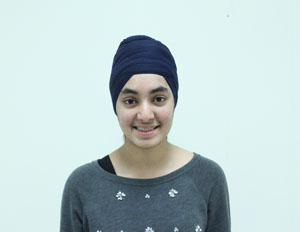Sahibnoor Kaur is the only turbaned Sikh at the school and said she appreciates her freedom of religion in America and the way people accept different religions.
“Especially in America, since my parents are from India, there is freedom. We are a different religion, and the Sikhs are a minority in India, so they are actually discriminated against there. Here people don’t do that. There is bullying. I’ve been bullied once, but here it is a lot better,” Kaur, sophomore, said. “They understand you are different and everyone is their own person. Christians are the majority, but it’s not as difficult to be yourself. All my friends are not from my religion, and they are understanding. In America, it’s not just the law that allows you to express your religion, but the people are more accepting of it as well.”
Kaur follows Sikhism, which is the fifth largest religion in the world, according to American Live Wire’s website. Sikhism has over 20 million followers, most of whom live in the Punjab province of India. As a strict follower of her religion, Kaur believes in wearing a turban as well as not cutting her hair.
“We have specific sets of rules for every day. In the morning we have a set of prayers. Same in the evening. It doesn’t matter if you are going to school or not. I also put on my turban every morning,” Kaur said “It’s a controversial topic in my religion. We were originally told to wear a turban, but there are some people that don’t. The original point is to make you stand out. People do ask me about it, and I tell them the basics of my religion, that we don’t cut our hair, and that when it’s this long, it’s easier to keep it covered and tie it up, and the turban does both. We don’t cut our hair because we believe the God gave us what he gave us for a reason. We feel like [cutting your hair] is abusing the gift God gave you. And of course, [the turban] makes you stand out as your own identity.”
Kaur said she has gotten used to standing out, and that it is easier as she gets older.
“It’s not really hard anymore. Last year was a little awkward, and a little hard, but now I am more proud of wearing it, and more comfortable being who I am. People ask me about [my turban], but it isn’t as common anymore. In middle school everyone asked about it,” Kaur said. “I’ve been like this since kindergarten. It was harder in elementary and middle school because people aren’t mature enough to accept other people. In high school it’s not as hard.”
Although Kaur believes Americans are more accepting of other religions, she said people can still be wary of what they do not understand.
“In seventh grade there were these kids at school, eighth graders, and they called me ‘towel head’. The first few times I shrugged it off. I went home and talked to my parents and we decided not to talk to any authority. I just went up to them and said, ‘Look, if you want to learn about my religion I can tell you why.’ By being kind like that, they kind of blamed each other for it and they stopped. We just started saying ‘hi’ to each other in the hallway. That’s the biggest problem I’ve faced in school. Bullying is just because people don’t have education about something, so that’s how they express it.”
Whenever people are not familiar with her religion, Kaur explains the basics of Sikhism.
“We are monotheistic. We believe everyone is equal. We don’t believe in the caste system, which is really common in India, so that is different from other religions there,” Kaur said. “We believe in vegetarianism, no intoxicants, no adultery, and you can’t cut your hair. We go to the gurdwara every Sunday.”
A gurdwara is comparable to a church or temple, according to Kaur. The gurdwara she attends is in Palatine.
“[Our gurdwara is] the only one in our area. My family teaches music every Saturday at the gurdwara, so we are pretty connected,” Kaur said. “Every Saturday we have a program at someone’s house. There are five to six families and we go to each other’s houses and sing hymns. It’s new for us, but it’s pretty common in other Sikh communities. Not everyone is as connected to the gurdwara, but because we are so strict, we are.”
One reason her family is strict in their religion is because her parents grew up in India, according to Kaur.
“My parents are from Punjab, which is a state in India. They grew up there, studied there or went to college there, and then when I was one year old, we moved here. That’s the reason we’re so 100 percent religious. Some people’s beliefs aren’t as strong, but being based in India does affect your life.”

